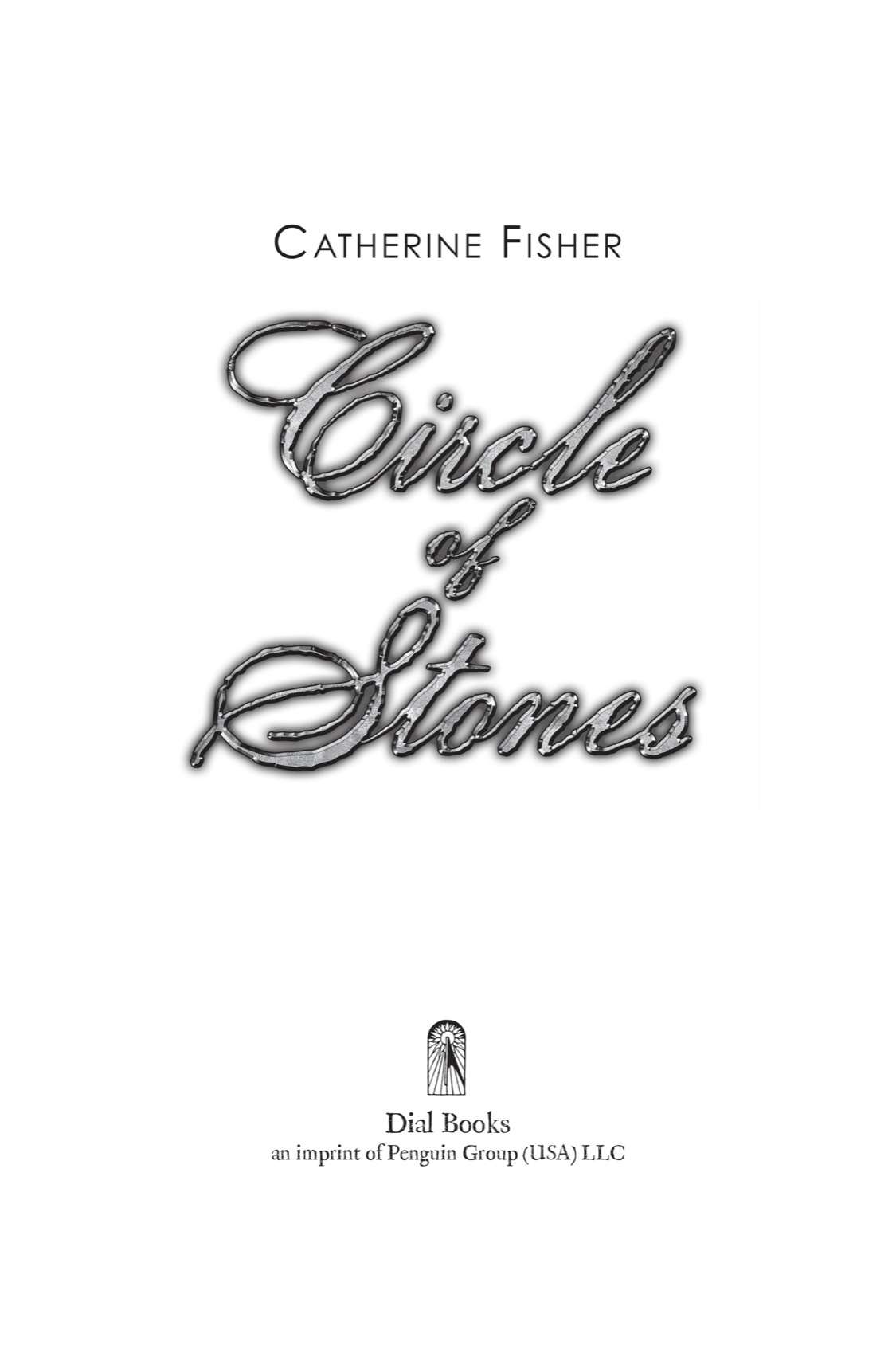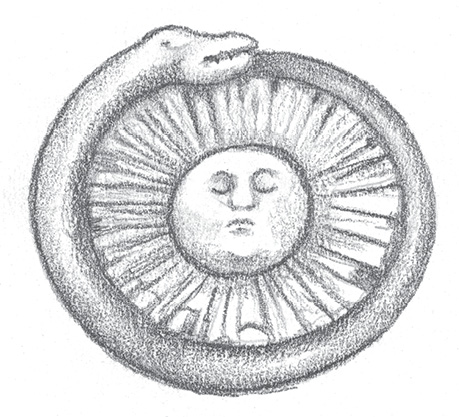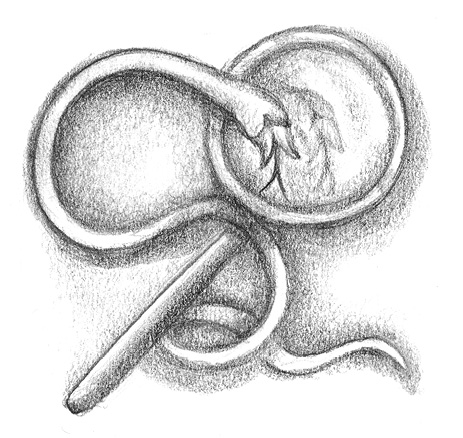Circle of Stones
Authors: Catherine Fisher


DIAL BOOKS
Published by the Penguin Group
Penguin Group (USA) LLC
375 Hudson Street, New York, New York 10014

USA / Canada / UK / Ireland / Australia / New Zealand / India / South Africa / China
penguingroup.com
A Penguin Random House Company
Published in the United States 2014 by Dial Books
Published in Great Britain 2010
by Hodder Children's Books, a division of Hachette Children's Books
Copyright © 2010 by Catherine Fisher
Penguin supports copyright. Copyright fuels creativity, encourages diverse voices, promotes free speech, and creates a vibrant culture. Thank you for buying an authorized edition of this book and for complying with copyright laws by not reproducing, scanning, or distributing any part of it in any form without permission.
You are supporting writers and allowing Penguin to continue
to publishe books for every reader.
Library of Congress Cataloging-in-Publication Data
Fisher, Catherine, date.
Circle of stones / Catherine Fisher.
pages cm
Originally published in Great Britain by Hodder Children's Books, 2010.
Summary: The mysterious Circusâa circular street of thirty housesâin Bath, England, provides the hub for three intertwining stories about a contemporary girl with a terrible past, an eighteenth-century architect obsessed with druids,
and a prehistoric king who learns to fly.
ISBN 978-1-101-59336-3
[1. Bath (England)âHistoryâFiction. 2. Great BritainâHistoryâFiction.
3. Druids and druidismâFiction.] I. Title.
PZ7.F4995Ci 2014 [Fic]âdc23 2012033348
The publisher does not have any control over and does not assume
any responsibility for author or third-party websites or their content.
Version_1
In Memoriam
John Wood
The Design
I began to turn my thoughts towards
the Improvement of the City by Building.


Bladud
S
top now. To go further is dangerous.
The circle is the oldest magic.
If you enter it, it will enfold you.
My name was forbidden. No one spoke its syllables to me anymore. No one touched me, or held me close. Can you imagine that, you who live far away round the ring of years? If a man is ill, that's bad enough. But if a king falls sick, his kingdom is blighted, and he is responsible.
At first I felt itchy and fevered. I was given every care. But as the moon waned, the marks of the disease became clear, erupting in boils and pustules on my skin.
Sacrifices were made, omens consulted. The stones told me what had to be done. I chose a moonless night, and when it was darkest I rose from my bed and walked away from my kingdom.
My people came out to watch me go.
They made two lines across the downs; they muffled their faces against fear. My wife, my children avoided me with horror.
I was an outcast.
A ghost under the moon.
Far from the peoples of the circles I crept, not coming close enough for them to see the ruin of my face.
How many months I lay in the dead leaves I don't know.
Without the circles, there is no time and no way of measuring.
My clothes withered to rags.
My skin was torn with scratches, seeping with pus. I was a contagion, a leprosy in my own land. I was a king and a druid and a man about to die.
I needed a miracle.
And I found one.

Sulis
T
he pale purple bag Alison had bought her in Sheffield was on her lap and she looked out at the perfect city where she would be healed.
The train window was grimy, but through it she could see how the buildings climbed the hill, how all their spires and curved terraces and wide streets were cut from the same buttery, honey-gold stone. Precise. Beautiful.
Opposite, Alison watched. “Is it like you thought?”
“Better. Much better.”
“There are Roman remains under parts of it, aren't there?”
She nodded, her eyes on her reflection in the glass. “Springs of hot water. The temple of a goddess.” She'd spent an afternoon in the library in Sheffield, finding out.
Alison laughed. “You've done your homework, then.”
She frowned. Alison often pretended to be ignorant, just a dull social worker who knew nothing. It was always annoying.
“The Romans called the city Aquae Sulis. The waters of Sulis. That was the name of the goddess.” Her voice was cold, and she gave Alison her expressionless look.
Alison's eyes widened. “So that's where you got the name from. No wonder I'd never heard of it.”
The guard's voice crackled over the speakers. “Change here for stations to Bristol Temple Meads and stations to Taunton. Please make sure you have all your belongings, and mind the gap as you leave the train.”
She stood, feeling tension in her stomach as she swung the bag over her shoulder. Alison squeezed past a man reading
The Times
and hauled the two suitcases down from the rack with strong hands, carrying them awkwardly sideways in the narrow aisle.
The train slowed along a long platform. She saw that even the station was golden, behind its advertisements for films and books, its coffee bar. Her mouth was dry. Her hands itched.
Alison's perfume was sweet and cloying, and the whole line of standing people lurched in unison as the train stopped. The doors unlocked with a crack that made her jump and stare at the glass, thinking a stone had been flung.
But the window was whole, and smooth.
And then they were stepping down onto the platform, into a crowd of impatient people who pushed past her and took no notice of her, and there were new noises and a breeze and she breathed it all in deep, the smoky railway smell, the wafts of coffee. Girls ran and hugged. A man said “the utmost harmony and balance” into a mobile phone as he walked by.
Alison turned. “All right?”
“Fine.” She pulled the backpack over her shoulder. She'd keep the joy and the fear secret, hidden deep inside.
They went down some steps and into the ticket office. It was nowhere near as busy as Sheffield. A few people stood in lines for tickets, but when the crowd from the train had streamed out into the street, it was almost quiet.
“No sign of them.” Alison frowned; the little lines on her forehead were deep. She dumped the suitcases by the wall. “They said they'd be here to meet us. I'll check if they're outside.”
When Alison was gone she felt awkward, just standing there. Her eyes were alert, trying to take in everything, but you couldn't, could you, there was too much, and before she realized, the old anxiety had come back, and she was watching people to see if they were looking at her face, if they recognized her. Stupid! She turned away, took a deep breath, closed her eyes.
They don't know you. No one is looking at you. You're safe. This is a new life. You're a new person
. Dr. Malory's voice was calm in her head. She opened her eyes and read the posters on the wall. One of them was a tourist ad for Stonehenge. SEE THE GREATEST STONE CIRCLE IN BRITAIN! It showed the famous megaliths under a wide blue sky. She read it three times. Then she pulled out her sunglasses and put them on.
“I knew they'd be late! I distinctly said four thirty!” Alison was back, with a faint sweat on her dark skin, hauling up the cases. “Come on. We'll wait outside.”
Taxis were lined up in front of the building. She could have jumped in one. She could have gone anywhere. The drivers looked at her, but it was all right. They were only looking for a fare. They saw a black woman in a suit and a grungy student. They didn't see
her
. She was invisible.
Alison had the mobile phone out, but it was obvious by her face that there was no answer. “This is a real pain. I have to get the train back in twenty minutes . . .”
“Then go. I'll be fine.”
Alison glared. “You know I can't do that. I have to be here with you till they come.”
“Hand me over personally.”
“Listen, Mâ”
“Deliver me, like a parcel.”
She liked to tease Alison. Torment her. Alison knew, because she said, “You just have to have a go, don't you?” Then her eyes widened and she snapped the phone shut and smiled in relief. “Here they are.”
They came almost at a run, through the cars, and they were exactly as she remembered from the interview, and the visit to the zoo.
Hannah's blond hair was tied up in a blue-and-orange wisp of scarf. She wore a print tea dress and a pale green cardigan. “Oh God,” she said, “we're so sorry! The traffic.”
Simon wore a hooded jacket and jeans with deliberate holes in them. He was older, his hair threaded with gray. Forty, even. Trying to look young. “Hi,” he said.
She smiled. “Hi.”
Alison shook their hands. Suddenly it all seemed a bit formal, and they stood looking at one another among the taxis. Then Simon came forward and kissed her on both cheeks, and she smelled his woody aftershave, and it felt strange. Hannah did it too. Her lips were cool. “Have you decided on a name?”
She stepped back. “Yes.”
Alison scowled. “She could have had any name in the world and she's picked one that will make her stand out a mile! The whole idea of being here is to be inconspicuous. To be safe.”
“I'm having it and you can't stop me.” She turned to her new foster parents. “From now on,” she said, “you must call me Sulis.”
They took it fairly well. Hannah laughed, a nervous, surprised laugh, and Simon put his head on one side and considered. “Why not? Maybe it's the sort of name we'd have chosen for our kids. Don't you think so? A bit out of the ordinary. A bit hippy.”
Sulis thought so. She had known as soon as she'd first seen them that the new name couldn't be boring, invisible. “The best way to hide,” she said, “is not to hide at all. Don't you think?”
“Are you sure?”
“I like it. And you can always shorten it to Su.”
Simon nodded, as if the decision had been his. He said, “Right. Sulis it is. You'll come back for some tea, Mrs. West?”
“I can't, I'm afraid.” Alison put on her regretful look. “I have to get back on the next train.” She glanced around uneasily. “Can we go somewhere a bit more out of sight?”
“Car's around the corner,” Simon said quickly. He picked up the suitcases and walked off, not looking back. They trailed after him. To Sulis's surprise, Hannah slid a furtive arm around her shoulders and squeezed. “We're so pleased to have you with us,” she whispered. “We're all going to get along fine, I can tell.”
Sulis smiled. She'd heard that often enough.
Squashed into the back of the car, Alison delved into her briefcase. She pulled out a large envelope. “It's all in here. Passport and birth certificate in the new name. National Insurance. Health records. Everything you need.”
Simon said, “Photographs?”
“Of her from a baby, with both of you. The technicians did them, mixed you in digitally or something. School reports . . . well, you'll see. There's also a contact number with our department, but that's to be used in emergencies only. The local social services and police have liaison officersâtheir numbers are in there too. They'll be in touch.”
Sulis scowled. “New life, you said. I thought that meant no more social workers.”
“Yes, but you have to understand . . .”
“Oh, I
understand
.” She turned and stared out of the car window. On the opposite sidewalk a man sat in the window of a cafe, drinking from a white cup. He stared at her, and she put the sunglasses on again, hastily. “You've gone through it often enough.”
Alison swapped a pained look with Simon. “When you're eighteen, MâSulis, you can do what you like and you know that. Three months, that's all. Until then, you're still our responsibility.”
“Fine.” She wondered if there would be some sort of surveillance on her. How would she know? Maybe the man in the cafe was one of them. But he was already gone, paying for his meal at the cashier.
Alison slid to the end of the warm seat. “Good-bye then, love, and good luck. Have a great life. Don't let the past spoil it for you.”
They hugged. Sulis felt the woman's soft body squash against her, smelled the Chanel she always wore. She was surprised at the sudden pang of remorse that came over her. She'd never been that fond of Alison. Of all the social workers she'd knownâand there had been dozensânone of them had ever been a real friend. But as the woman climbed out and adjusted her jacket and waved, Sulis knew with a cold certainty that this was one more person that she would never meet again. She should be used to it. Her life was full of strangers, coming, staying till she almost knew them, and then going. But as she waved back this time, an odd emptiness opened inside her.
When Alison had gone there was silence in the car. Then Simon leaned forward and turned the CD on. Some jazzy music burst from the dashboard. He turned it down. “So. Let's go.” He turned and looked at her over the back of the seat, and his face was suntanned as if from some recent vacation. “And from now on our daughter is back from school and we're all one happy family.”
She smiled faintly. “Won't people ask . . .”
“We've only been here ourselves for a few months. No one knows us much. We're all new in the city.”
As she sat back, and felt the engine start, she wished he had said something else. Something more comforting. Something that welcomed her, that showed he knew she might be feeling scared, or apprehensive. But he had already turned around and was pointing out a traffic cone the car had to avoid.
Hannah drove. She chatted too, but Sulis barely heard. Because they had turned out of the parking lot and were passing through the streets, and the buildings rose on each side of her now in stately beauty, their Georgian facades calm and orderly, their names carved, their door frames of white wood, the railings around their sunken areas painted black and hung with window boxes and baskets of flowers.
As the car droned up behind a red double-decker bus full of tourists, Sulis hugged the purple backpack to her chest and tried not to smile too broadly. She had seen photographs, but they had not done the city justice. The sun was out and the golden streets were brilliant with shoppers, cars, and crowds of visitors. Gulls and starlings flapped on the housetops. At the top of the road the car turned left, then right into a street of grand proportions, the houses in a stately row, their high windows shining. She felt as if they were courtiers, lined on each side to escort her up the hill, beautiful old buildings that filled her with a sense of calm, the perfect orderliness of the city. And as the car turned the last corner she gave a gasp of surprise, and Hannah grinned at her in the rearview mirror. “Great, isn't it? It always gets me too.”
They had entered a circle of houses. Three streets led to it like the spokes of a wheel. As the car purred slowly around, Sulis felt a sort of quiet delight. The facade of the circle held her inside it, it rose to the blue sky. Pillared, with three stories of white tall windows, the houses were not separate, they were all one terrace, and along the roofline huge stone acorns stood at regular intervals.
The pavements were broad, the railings black and glossy. In the heart of the encircled space five huge trees soared well above the rooftops.
“Welcome to the King's Circus,” Simon said.
“You live
here
?”
He nodded. “Not a whole house, that would cost a fortune. But we've got an apartment, on the top floor. Great views.”
Hannah pulled up to the curb. “This is it, Sulis.”
As she climbed out and stood on the sidewalk, Sulis had the strangest feeling that she had somehow come home, though she had never, as far as she remembered, been here before. Since that terrible day when she was seven, she had lived in a dozen different flats and houses, some of them poky, most of them average, once even on a farm out on the Yorkshire moors. But never anything like this. The step, the white door with its gilt knocker, the airy hallway floored in black and white tiles, the staircase curving upward, were all beautiful. She let Simon bring the bags; she was too eager to run up behind Hannah and see.
“There's a Mr. Thomas in the basementâbusinessman,” Hannah called back, her small hands sliding up the wooden rail. “Mrs. Wilson on the firstâancient, been here years and years. Couple on the second. Second-homers, from London, I think. Only here weekends. And then there's us.”